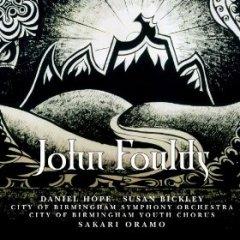John Foulds - Three Mantras From Avatara, Lyra Celtica, Apotheosis, Mirage (2004)
John Foulds - Three Mantras From Avatara, Lyra Celtica, Apotheosis, Mirage (2004)

3 Mantras Op.61b 1. I Of Action and Vision of Terrestrial Avataras 5:22 2. II Of Bliss and Vision of Celestial Avataras 14:08 3. III Of Will and Vision of Cosmic Avataras 6:57 Lyra Celtica Op.50 4. I Lento - Allegro commodo 10:11 5. II Largo - Quasi allegretto piacevole 6:07 Music-Poem No.4 Op.18, 'Apotheosis - Elegy' 6. I Quasi funèbre.18, 'Apotheosis - Elegy' : I Quasi funèbre 2:02 7. II Poco meno 1:00 8. III Andante lento 4:05 9. IV Tempo de la prima stanza 4:18 Music-Poem No.5 Op.20, 'Mirage' 10. I Largo 3:54 11. II Moderato 2:40 12. III Lento assai - Allegro molto 4:11 13. IV Presto 3:18 14. V Lento giusto - Adagio 5:38 15. VI Moderato trionfale 4:12 Susan Bickley – mezzo-soprano Daniel Hope - violin City of Birmingham Symphony Orchestra Sakari Oramo – conductor
Over the years, it has been quite noticeable, from published material and from audience comment at music society meetings, that the recording of John Foulds’ music has been considered one of the most urgent tasks. To date comparatively little has appeared on disc notably a valuable Foulds album released by Lyrita which incidentally included The Mantras. This new recording has therefore created considerable interest. My review comes a little late after the splendid background article by John Talbot which can be read on this site.
The extraordinary artwork on the cover of this album’s booklet hints at the equally extraordinary music. This artwork, untitled, is by John Patrick Foulds, the composer’s son who contributes an insightful ‘Foreword’ detailing the colourful Foulds household.: "my sense of smell was early stimulated by roses, oil paint, batik wax smoking and joss sticks burning on ‘The shrine’". He goes on to relate that his mother (Maud McCarthy) and Foulds had ‘reached Theosophy’ from quite opposite family backgrounds: she from being an Irish Catholic, and he Plymouth Brethren. ‘She moved via Plato, Ruskin and Morris to a studious eclecticism; he in search of ever deeper meaning through his interpretative, then creative and innovative music.’
Like Gustav Holst, Foulds was fascinated by the music of the Indian subcontinent and like Holst, whose chamber opera Savitri, was set in India, Foulds worked on a mysterious Sanskrit opera, Avatara which he eventually abandoned. From this work he developed his Three Mantras, blending a little eastern with conventional western musical forms. Foulds’ orchestral palate is vividly coloured. The first Mantra, ‘Of Action and Vision ... of Terrestrial Avataras’ (The Hindu term ‘Avatara’ means the incarnation or earthly manifestation of a god such as Rama or Krishna) is wild and fast-moving, hedonistic and sensual with heroic fanfares. The second Mantra, ‘Of Bliss and Vision ... of Celestial Avataras’, with its celesta figures and wordless women’s chorus, is reminiscent of the unearthly beauty of Holst’s ‘Venus’ and ‘Neptune’ from The Planets. Determination, conflict and violence pervade the Third Mantra ‘Of Will and Vision ... of Cosmic Avataras’ that kindles furious orchestral energy.. Under Oramo’s direction, the City of Birmingham Symphony Orchestra delivers awesomely powerful readings of the outer movements and a vision of sylvan ethereal beauty for the lovely central Mantra that also nods towards Debussy.
Foulds’ musical experimentation led him to write the Lyra Celtica, a concerto for Voice and Orchestra (a most unusual nomenclature). It was apparently written for Maud McCarthy who could sing in the 22-tone micro-tonal scale of Indian music. Such scales are used in this wordless Lyra Celtica. Susan Bickley sings the ‘Ah, Ahs’ of this music that unite the worlds of India and the Hebrides. It is a strange, exotic mix that in the main works surprisingly well. The ear is captivated; but, occasionally, well hmm… its Foulds’ insistence on those scales!
Apotheosis treads a more conventional path. It begins with a funeral march beneath plangent violin tones. The music broadens out with touches of Mendelssohn, Brahms and Saint-Saëns apparent in Andante lento section, the contra-bassoon reinstating the funereal mood that introduces the darker more melancholic fourth final section. Daniel Hope is sensitive to the work’s overriding mood of grief and regret.
Foulds’ grandiose 1910, Mirage, was developed from the composer’s Vision of Dante cantata. It might be viewed as a sort of Richard Strauss-like tone poem because of its large-scale outlook and orchestration but its influences are many and varied - as are its moods. The movements’ subtitles provide clues to their spiritual and philosophical nature: beginning with ‘Immutable nature’ – that has a still and mysterious opening leading ultimately to fanfares over a foreboding bass line and agitated string figures; then ‘Man’s ever-ambition’ is restless, questing music screwing up into increasingly hysterical intensity until a mighty climax is reached before the ‘Man’s ever-unattainment’ music that is, at first, quieter but punctuated by sour slides (using those 22 tone microtonal scales again), then defiantly thrusting. A quicksilver, somewhat voluptuous presto section, ‘Mirage’, follows with quivering strings and jeering brass that nicely introduces the quiet prayer-like ‘Man humbled’ and finally to the majesty and mysticism of the final ‘Man self-triumphant’.
At last the extraordinary sound-world of John Foulds is captured on disc in first class performances and sound. Required listening for every British music enthusiast. ---Ian Lace, www.musicweb-international.com
download: uploaded anonfiles yandex 4shared solidfiles mediafire mega filecloudio
Zmieniony (Czwartek, 14 Listopad 2013 21:58)








